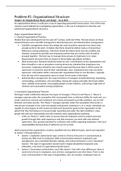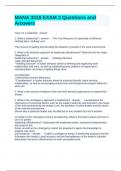Paper 3; EU Law; European Sources of Law
Key Cases Notes
Treaties Treaties
Macarthys Ltd V Smith (1980) – Smith As a result of the European Communities Act 1972 all treaties signed by our government
could rely of the TFEU which provided became part of English Law automatically. There was no requirement for any domestic
equal pay for men and women, even if legislation to be passed by the UK Parliament to bring the law into effect, therefore anyone
they weren’t employed at the same time could enforce their rights in UK courts and rely on the relevant treaties to support their case.
Regulations Regulations
Re Tachographs: Commission v United EU Regulations were directly effective in the UK and, as with Treaties, no domestic legislation
Kingdom (1979) – Member states have to was required to bring them into UK law. The TFEU confirms they are “binding in every respect
comply with regulations and directly applicable in each member state”.
Directive Directives
Working Time Directive – A directive The EU implements most European law via directives. Directives cover many areas such as
issued in 1993 that should’ve been health and safety of workers, equal rights, and consumer rights. Directives are legally binding
implemented by 1996 but the UK upon member states, but they do require the states to pass their own laws to bring them into
government did not do so until the effect. This is so the member state can choose how they will give effect to the directive. The
Working Time Regulations 1998. TFEU confirms that directive “bind any member state to which they are addressed as to the
result to be achieved, while leaving to domestic agencies a competence as to form and
Marshall V Southampton and South West means”. Usually there is a time limit set by Europe and if the member state does not
Hampshire Area Health Authority (1986) – implement it by the time they can be fined. In the UK, directives were implemented by the
Marshall was able to enforce her rights to passing of Acts of Parliament or by Statutory Instruments.
retirement under the Equal Treatment
Directive If a member state fails to implement the directive into their domestic law, an individual can
still enforce the rights the directive gives. This is called the ‘direct effect’ but only applies
Duke V GEC Reliance Ltd – Mrs Duke was where they are enforcing their rights against the state. For example, if the person is employed
unable to rely upon the Equal Treatment by a public body, they could enforce any employment rights given by a directive, even without
Directive as her employer was a private any UK law on the matter. This is known as ‘vertical direct effect’. Unfortunately, individuals
company cannot enforce rights given by directives against other individuals or private companies. This is
Francovich V Italian Republic (1991) – known as ‘horizontal direct effect’.
Francovich was able to recover his Courts are under a duty when interpreting domestic legislation to ensure they try and give
financial loss due to the Italian effect to any directives which might apply. The role of domestic and European courts is
government failing to implement a therefore very important as they must ensure the law is complied with and that people are
directive to protect wages of employees if afforded their rights. The European court has the power to order a member state to pay
their employer became insolvent compensation to the individuals concerned if they are found to be in breach of a directive
under ‘vertical direct effect’. The court has the power to do this in order to ensure that
member states comply with the legislation. The courts don’t actually have any power to
enforce the compensation awards they make.
Key Terms and Definitions
Key Cases Notes
Treaties Treaties
Macarthys Ltd V Smith (1980) – Smith As a result of the European Communities Act 1972 all treaties signed by our government
could rely of the TFEU which provided became part of English Law automatically. There was no requirement for any domestic
equal pay for men and women, even if legislation to be passed by the UK Parliament to bring the law into effect, therefore anyone
they weren’t employed at the same time could enforce their rights in UK courts and rely on the relevant treaties to support their case.
Regulations Regulations
Re Tachographs: Commission v United EU Regulations were directly effective in the UK and, as with Treaties, no domestic legislation
Kingdom (1979) – Member states have to was required to bring them into UK law. The TFEU confirms they are “binding in every respect
comply with regulations and directly applicable in each member state”.
Directive Directives
Working Time Directive – A directive The EU implements most European law via directives. Directives cover many areas such as
issued in 1993 that should’ve been health and safety of workers, equal rights, and consumer rights. Directives are legally binding
implemented by 1996 but the UK upon member states, but they do require the states to pass their own laws to bring them into
government did not do so until the effect. This is so the member state can choose how they will give effect to the directive. The
Working Time Regulations 1998. TFEU confirms that directive “bind any member state to which they are addressed as to the
result to be achieved, while leaving to domestic agencies a competence as to form and
Marshall V Southampton and South West means”. Usually there is a time limit set by Europe and if the member state does not
Hampshire Area Health Authority (1986) – implement it by the time they can be fined. In the UK, directives were implemented by the
Marshall was able to enforce her rights to passing of Acts of Parliament or by Statutory Instruments.
retirement under the Equal Treatment
Directive If a member state fails to implement the directive into their domestic law, an individual can
still enforce the rights the directive gives. This is called the ‘direct effect’ but only applies
Duke V GEC Reliance Ltd – Mrs Duke was where they are enforcing their rights against the state. For example, if the person is employed
unable to rely upon the Equal Treatment by a public body, they could enforce any employment rights given by a directive, even without
Directive as her employer was a private any UK law on the matter. This is known as ‘vertical direct effect’. Unfortunately, individuals
company cannot enforce rights given by directives against other individuals or private companies. This is
Francovich V Italian Republic (1991) – known as ‘horizontal direct effect’.
Francovich was able to recover his Courts are under a duty when interpreting domestic legislation to ensure they try and give
financial loss due to the Italian effect to any directives which might apply. The role of domestic and European courts is
government failing to implement a therefore very important as they must ensure the law is complied with and that people are
directive to protect wages of employees if afforded their rights. The European court has the power to order a member state to pay
their employer became insolvent compensation to the individuals concerned if they are found to be in breach of a directive
under ‘vertical direct effect’. The court has the power to do this in order to ensure that
member states comply with the legislation. The courts don’t actually have any power to
enforce the compensation awards they make.
Key Terms and Definitions









